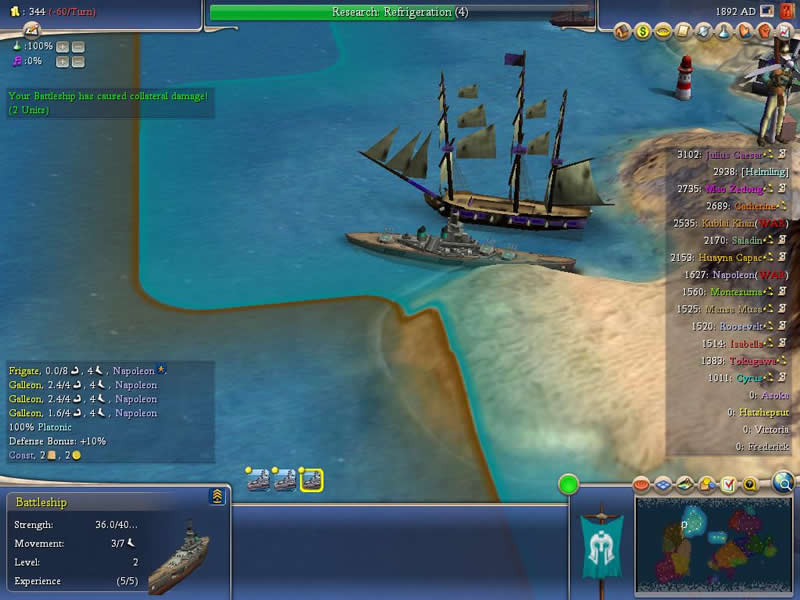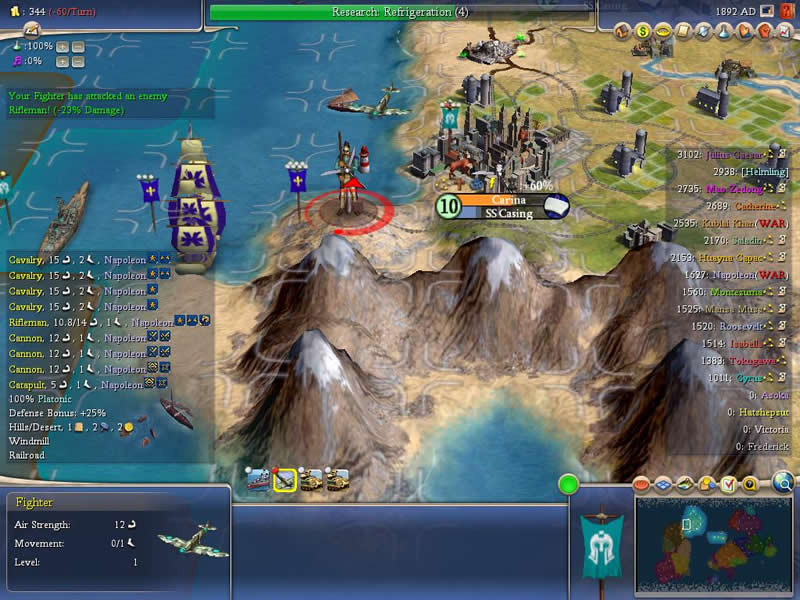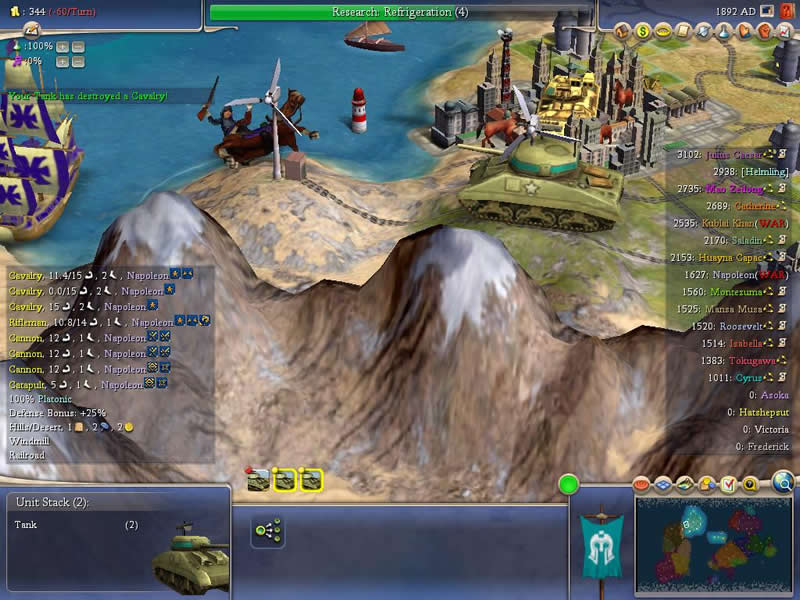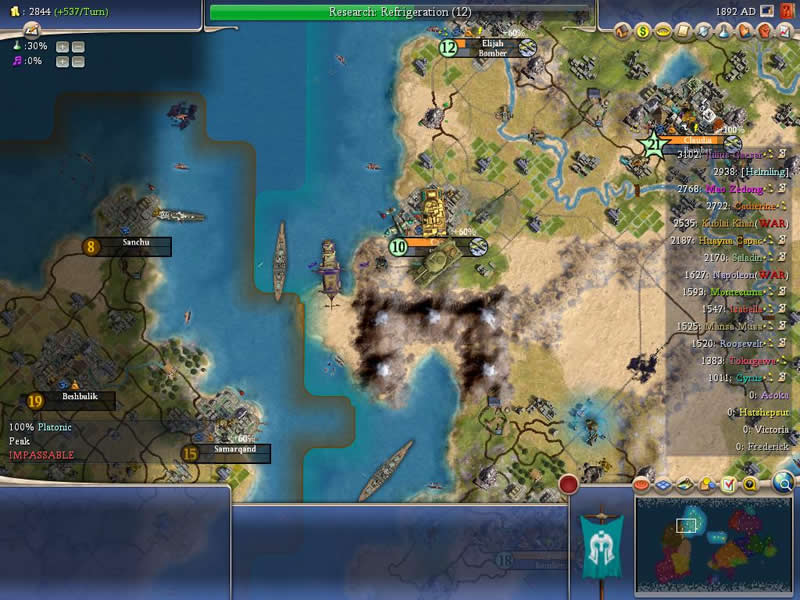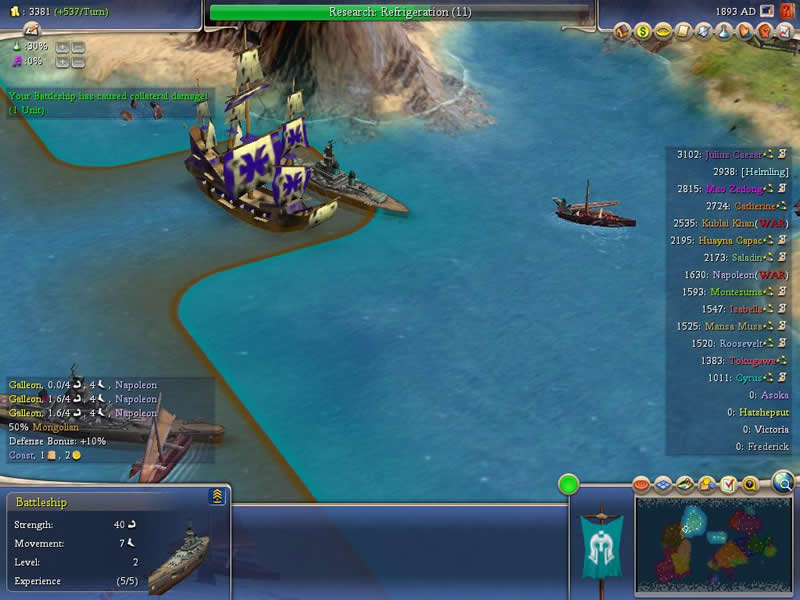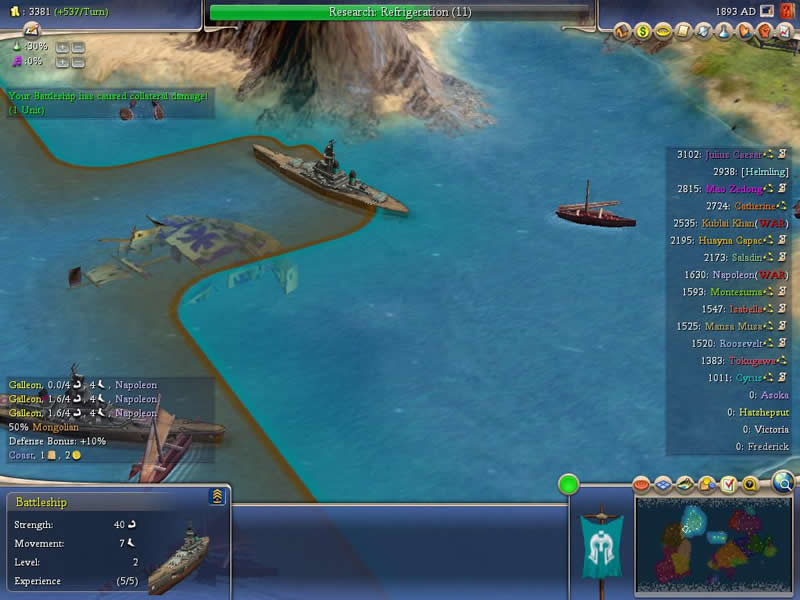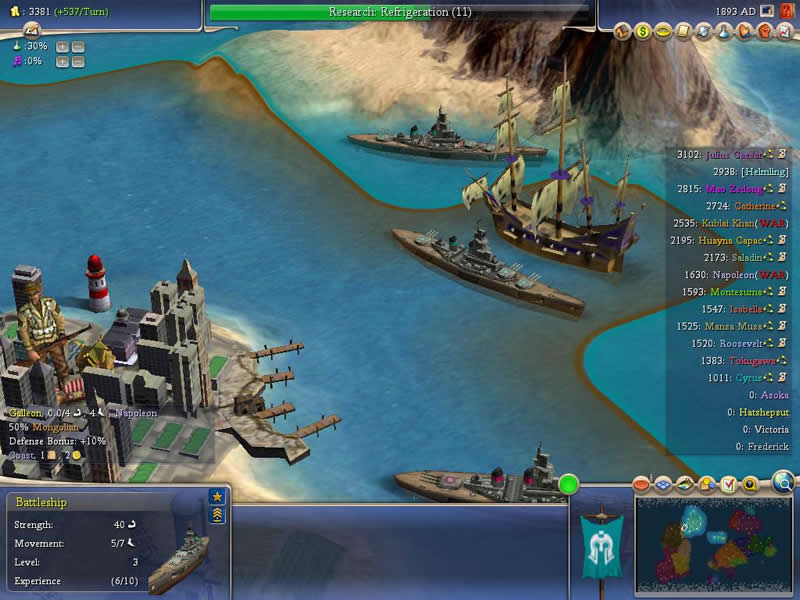Defense Minister Acrisias stood before the large display screen, waiting for the images to resolve on the screen. “These are the images transmitted from our reconnaissance run over the enemy fleet,” he began, pointing to the high-altitude image, which then slowly scaled to a topside view of one of the enemy frigates. “This hull configuration and mast alignment is definitely French,” he concluded.
“The French?”
“Yes, we can be certain now.”
“That makes about as much sense as anything,” he groaned. “This whole thing is insane.”
“The French are on the other side of the world, what are they thinking?”
“How did we miss this, that’s the question?”
“We don’t have much active intelligence gathering underway inside of France. We don’t monitor their fleet.”
“Why should we? No French military vessel has come near Philosopher King waters in two hundred years,” General Halius replied. “They’re a completely backward country.”
“Not completely,” Helmling remembered. “They do have the technology for modern ships. Certainly they have more modern ships than these.”
“Using these legacy fleets appears to have been calculated, sir.”
“How so?”
“They came in under sail. I’ve had the sonor net logs checked. We did pick up their steam engines, but only after they near the shore, only after they were past our sonor buoys. The computer program did not register sailing ships—no matter how many were detected—as a threat.”
“General, I want that system reprogrammed immediately.”
“Yes, sir, but from the time we went to full alert we have actual human ears monitoring all sonor channels.”
“Good, and there are no other fleets approaching?”
“None, sir.”
“So this is it? This is the entire French invasion force?”
“It would appear so,” Acrisias answered.
“How did they organize it without attracting our attention.”
“We believe the ships sailed from different ports and did not converge in the North Sea until they reached a waypoint somewhere not too far from our territory.”
“Then they definitely came in from the north, past Mongolian territory?”
“No doubt about it, sir.”
“Then the Mongolians had to know,” Halius snarled. “They’re as guilty as the French. They knew damned well they were pulling this stunt!”
“Calm down, General,” Helmling said. “Acrisias, show us the shots of the French forces on the ground.”
The images changed. The coast was visible, but the focus was now on the hills near the city. As the images resolved and zoomed, hordes of ant-sized soldiers were seen dotting the landscape, many escorting large dark tubes and many more riding atop or moving beside larger organic shapes.
“What’s our projection of the size of this force?” he asked.
“Four divisions of cavalry, some rifle-bearing infantry, and a large contingent of artillery pieces—probably five to six thousand men.”
“What could they possibly be thinking?” Trade Minister Meles wondered aloud.
“They were obviously hoping for a surprise attack that would allow them to capture one of our cities,” Helmling answered. “I suspect their end goal was extortion.”
“Extortion?”
“They’re a third-rate power with a huge, obsolete military. We must have looked like sitting ducks. Advanced, yet undefended. If they could ransom Carina for resources and technology then it would be worth it for them,” Helmling concluded.
“Can they take the city?” Meles asked horrified.
“Hell no,” Halius answered gruffly.
“How soon until we can start combat runs from the air?”
“Give me another hour, sir, and then we’ll start raining down unpleasantness on those poor bastards.”
“Should we offer them the option of surrendering?”
“One of the police units that got away confirmed that they’ve already killed some of our people. They’re obviously not going to surrender until they’ve become convinced of the necessity. They’ll have to be hit first—“
The door opened behind them and a naval attaché officer entered. “Gentlemen, I have an urgent communication from the Captain of the Battleship Achilles.”
“Patch it in,” Helmling said.
The naval officer nodded and disappeared. A moment later, audio crackled through the speakers in the room.
“Go ahead, Captain, you have the Situation Room.”
“Sir, we have encountered a navigational problem in trying to intercept the enemy fleet.”
“Dammit,” Halius and Helmling said together, remembering. “The breakers.”
“That is correct, sir. Our battleships and destroyers ride too deep in the water. With the silt runoff from the mountains at this time of year, we cannot pass the Great Desert Cape without use of a lifting tug, which would take days and would leave us vulnerable to enemy fire.”
“Most of the fleet is south of the Cape, dammit,” Halius growled. “If we can’t get them, then all we’ll have is one battlegroup to try to intercept a flotilla of several frigate and transport fleets from the French—that’s hundreds of ships!”
The room fell silent.
“There is one way,” Helmling said gravely.
“What?” Meles said.
“Sir, it has to be done,” Halius insisted, knowing what Helmling meant. “There’s no choice. We cannot leave that fleet intact to molest our shore-lines. They could begin shelling the city of Carina at any minute. One battle group will not be enough against that many ships, no matter how superior our firepower. It would run out of ammo just trying to sink them all!”
“Can you tell me what—“
“General,” Acrisias chimed in. “Consider what you’re saying very carefully. These ships are primitive. We should not take any extraordinary risks to combat them. One battle group should be able to—“
“Not without an unacceptable delay, dammit!” Halius continued, while Helmling stared blankly seeming not to listen at all. “We have the right to defend ourselves, let the Mongols go and—“
“Can someone explain what we’re talking about?” Meles pleaded.
“The battleships cannot pass through the shallow waters near the cape, Minister Meles,” Helmling explained calmly. “They can only reach the French fleet if they pass through Mongolian territorial waters.”
Meles inhaled slowly, finally understanding. “And you’re thinking about…but that would mean—“
“The Mongolians might not respond,” Halius countered. “Or they might just lodge some official protest.”
Helmling shook his head. “The Mongolians have been clear about the movement of military assets through their territory. During our last border negotiations they refused to even consider open passage for any military ship. You’re talking about moving several millions pounds of our best warships right through their fishing and commercial lanes. Let’s not make any mistake about what we’re considering here, gentlemen.”
The room fell silent again. This time it was interrupted by the captain’s voice on the speaker.
“Sir, the Achilles is almost at the cape. We need to either cut our engines or make a course change. I don’t mind telling you that my preference is to go forward and blow this invasion fleet out of the water.”
“Ms. Basiane,” Helmling said to his Chief of Staff, who had been silent thus far. “I need you to coordinate a joint session of the Senate and Quorum, as soon as possible. I’ll need to brief them on what I’ve done.”
“What you’ve done?”
“By the time they meet, we will have crossed the line.”
“Then you will—“ but Helmling cut off Halius’s question.
“Captian,” he said sternly. “You and the Achilles make full steam for Carina. The enemy ships are flying no flags, but are French in origin. “
“Understood, sir.”
“Sink that fleet, Captain.”
“And what about Mongolia?” Meles whimpered. “What if this leads to war?”
Basiane paused in the doorway. Acrisias turned from the screen on the wall. Meles stared at him with open eyes. Halius inhaled deeply, pinching up his face in resolution.
Helmling answered in a voice that was quiet, yet firm, “then so be it.”
“The French?”
“Yes, we can be certain now.”
“That makes about as much sense as anything,” he groaned. “This whole thing is insane.”
“The French are on the other side of the world, what are they thinking?”
“How did we miss this, that’s the question?”
“We don’t have much active intelligence gathering underway inside of France. We don’t monitor their fleet.”
“Why should we? No French military vessel has come near Philosopher King waters in two hundred years,” General Halius replied. “They’re a completely backward country.”
“Not completely,” Helmling remembered. “They do have the technology for modern ships. Certainly they have more modern ships than these.”
“Using these legacy fleets appears to have been calculated, sir.”
“How so?”
“They came in under sail. I’ve had the sonor net logs checked. We did pick up their steam engines, but only after they near the shore, only after they were past our sonor buoys. The computer program did not register sailing ships—no matter how many were detected—as a threat.”
“General, I want that system reprogrammed immediately.”
“Yes, sir, but from the time we went to full alert we have actual human ears monitoring all sonor channels.”
“Good, and there are no other fleets approaching?”
“None, sir.”
“So this is it? This is the entire French invasion force?”
“It would appear so,” Acrisias answered.
“How did they organize it without attracting our attention.”
“We believe the ships sailed from different ports and did not converge in the North Sea until they reached a waypoint somewhere not too far from our territory.”
“Then they definitely came in from the north, past Mongolian territory?”
“No doubt about it, sir.”
“Then the Mongolians had to know,” Halius snarled. “They’re as guilty as the French. They knew damned well they were pulling this stunt!”
“Calm down, General,” Helmling said. “Acrisias, show us the shots of the French forces on the ground.”
The images changed. The coast was visible, but the focus was now on the hills near the city. As the images resolved and zoomed, hordes of ant-sized soldiers were seen dotting the landscape, many escorting large dark tubes and many more riding atop or moving beside larger organic shapes.
“What’s our projection of the size of this force?” he asked.
“Four divisions of cavalry, some rifle-bearing infantry, and a large contingent of artillery pieces—probably five to six thousand men.”
“What could they possibly be thinking?” Trade Minister Meles wondered aloud.
“They were obviously hoping for a surprise attack that would allow them to capture one of our cities,” Helmling answered. “I suspect their end goal was extortion.”
“Extortion?”
“They’re a third-rate power with a huge, obsolete military. We must have looked like sitting ducks. Advanced, yet undefended. If they could ransom Carina for resources and technology then it would be worth it for them,” Helmling concluded.
“Can they take the city?” Meles asked horrified.
“Hell no,” Halius answered gruffly.
“How soon until we can start combat runs from the air?”
“Give me another hour, sir, and then we’ll start raining down unpleasantness on those poor bastards.”
“Should we offer them the option of surrendering?”
“One of the police units that got away confirmed that they’ve already killed some of our people. They’re obviously not going to surrender until they’ve become convinced of the necessity. They’ll have to be hit first—“
The door opened behind them and a naval attaché officer entered. “Gentlemen, I have an urgent communication from the Captain of the Battleship Achilles.”
“Patch it in,” Helmling said.
The naval officer nodded and disappeared. A moment later, audio crackled through the speakers in the room.
“Go ahead, Captain, you have the Situation Room.”
“Sir, we have encountered a navigational problem in trying to intercept the enemy fleet.”
“Dammit,” Halius and Helmling said together, remembering. “The breakers.”
“That is correct, sir. Our battleships and destroyers ride too deep in the water. With the silt runoff from the mountains at this time of year, we cannot pass the Great Desert Cape without use of a lifting tug, which would take days and would leave us vulnerable to enemy fire.”
“Most of the fleet is south of the Cape, dammit,” Halius growled. “If we can’t get them, then all we’ll have is one battlegroup to try to intercept a flotilla of several frigate and transport fleets from the French—that’s hundreds of ships!”
The room fell silent.
“There is one way,” Helmling said gravely.
“What?” Meles said.
“Sir, it has to be done,” Halius insisted, knowing what Helmling meant. “There’s no choice. We cannot leave that fleet intact to molest our shore-lines. They could begin shelling the city of Carina at any minute. One battle group will not be enough against that many ships, no matter how superior our firepower. It would run out of ammo just trying to sink them all!”
“Can you tell me what—“
“General,” Acrisias chimed in. “Consider what you’re saying very carefully. These ships are primitive. We should not take any extraordinary risks to combat them. One battle group should be able to—“
“Not without an unacceptable delay, dammit!” Halius continued, while Helmling stared blankly seeming not to listen at all. “We have the right to defend ourselves, let the Mongols go and—“
“Can someone explain what we’re talking about?” Meles pleaded.
“The battleships cannot pass through the shallow waters near the cape, Minister Meles,” Helmling explained calmly. “They can only reach the French fleet if they pass through Mongolian territorial waters.”
Meles inhaled slowly, finally understanding. “And you’re thinking about…but that would mean—“
“The Mongolians might not respond,” Halius countered. “Or they might just lodge some official protest.”
Helmling shook his head. “The Mongolians have been clear about the movement of military assets through their territory. During our last border negotiations they refused to even consider open passage for any military ship. You’re talking about moving several millions pounds of our best warships right through their fishing and commercial lanes. Let’s not make any mistake about what we’re considering here, gentlemen.”
The room fell silent again. This time it was interrupted by the captain’s voice on the speaker.
“Sir, the Achilles is almost at the cape. We need to either cut our engines or make a course change. I don’t mind telling you that my preference is to go forward and blow this invasion fleet out of the water.”
“Ms. Basiane,” Helmling said to his Chief of Staff, who had been silent thus far. “I need you to coordinate a joint session of the Senate and Quorum, as soon as possible. I’ll need to brief them on what I’ve done.”
“What you’ve done?”
“By the time they meet, we will have crossed the line.”
“Then you will—“ but Helmling cut off Halius’s question.
“Captian,” he said sternly. “You and the Achilles make full steam for Carina. The enemy ships are flying no flags, but are French in origin. “
“Understood, sir.”
“Sink that fleet, Captain.”
“And what about Mongolia?” Meles whimpered. “What if this leads to war?”
Basiane paused in the doorway. Acrisias turned from the screen on the wall. Meles stared at him with open eyes. Halius inhaled deeply, pinching up his face in resolution.
Helmling answered in a voice that was quiet, yet firm, “then so be it.”


